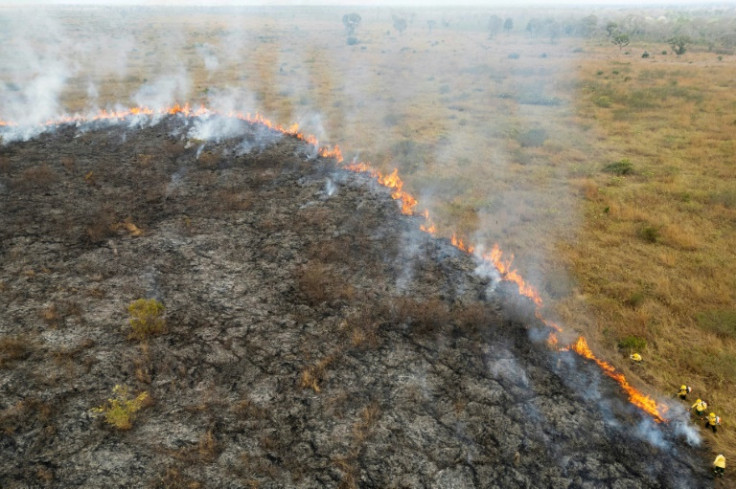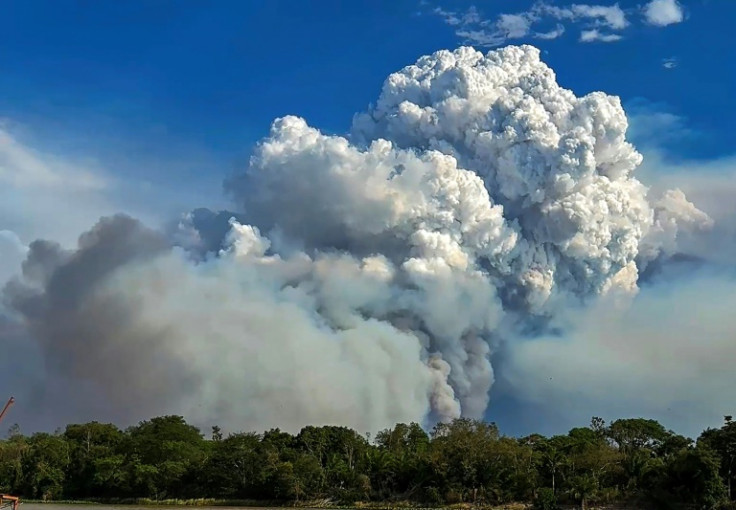
São Paulo, Brazil – The Pantanal, the world's largest freshwater wetland, is facing an unprecedented fire season, with data from Brazil's National Institute of Space Research (INPE) revealing 3,426 fire outbreaks between January and June 2024. This surpasses all historical records since 1988 when measurements began.
Images and reports from the region are alarming. In the first six months of the year, fire has already consumed 600,000 hectares, 143% more than in the same period in 2020, which was until then considered the worst year for the biome. In 2020, fires devastated four million hectares, a third of the entire Pantanal area, causing the death of an estimated 17 million animals.
Unlike the chaos of 2020, when fires typically peak in August and September due to dry weather conditions exacerbated by the season, the Pantanal has found itself engulfed in flames two months earlier than historical averages.
Gustavo Figueirôa, Director of Communication and Engagement at the NGO SOS Pantanal, links the current crisis to two primary factors.
"We are experiencing an extreme drought in the biome, with water coverage 61% below historical averages, compounded by human action," Figueirôa told Brazil Reports. "Areas that were once flooded for much of the year, generating substantial biomass, are now vulnerable to fire spread amidst the current dry and hot conditions. The majority of fire outbreaks were initiated near the Paraguay River, particularly around Corumbá. These areas are densely populated and easily accessible by boat, suggesting that the fires were likely started by human activity."
Burning to Cleanse
The human activity referred to by Figueirôa is known locally as "cleaning by fire." Agricultural producers often use controlled burns to clear fields and pastures of debris, pests, and to promote soil renewal. While authorized under environmental regulations, these fires frequently escape control and spread beyond rural properties.
A survey carried out by the Mato Grosso do Sul State Public Prosecutor's Office corroborates this. According to the prosecutors, the most recent fires started on 14 farms and ended up spreading to at least 100 other rural properties.
Ibraim Fantin, PhD in Water Resources and Ecology, and professor at the Federal University of Mato Grosso's Postgraduate Program in Water Resources, warned of the potential environmental catastrophe caused by such careless practices.
"Despite high temperatures, biomass doesn't combust spontaneously. One common practice in the Pantanal is pasture clearing with fire. Often, these are accidents due to careless actions intended to promote productivity and pasture health," Professor Fantin told Brazil Reports.
For two decades, Professor Fantin has studied the Pantanal, regularly conducting field expeditions to assess its conditions. He observed in February that traditional communities and riverbank dwellers were already facing serious challenges.
Normally, the Pantanal would be in full flood at this time of year. But instead, rivers were already lower than expected by up to two meters. Combined with local heatwaves and improper fire management, this situation significantly enhances fire propagation.

"We know that it didn't rain in the headwaters, so we know that this will be reflected in the Paraguay River in the lower Pantanal. There were no surprises. It's not for lack of warning (that the situation has reached this point), because the Pantaneiro already saw this happening," said Professor Fantin.
The floodplain in flames
The Pantanal spans 220,000 square kilometers across Brazil, Bolivia, and Paraguay, with 120,000 of them located in Brazil. The area extends between Mato Grosso do Sul (65%) and Mato Grosso (35%). On June 24, the extreme situation led the state government of Mato Grosso do Sul to declare an emergency. Among other things, the measure reduces bureaucracy and facilitates the release of money to the most affected towns, the purchase of equipment, and the hiring of firefighters to fight the flames.
The fires consuming the Brazilian Pantanal undermine one of President Luiz Inácio Lula da Silva's key environmental policies. In response, the government recently established a crisis center to monitor and coordinate immediate firefighting efforts and preventive measures against future devastating fires in the biome. The first concrete action announced was the release of R$100 million (USD $18 million) to hire additional firefighters, acquire equipment, and deploy necessary resources.
For biologist Gustavo Figueirôa, the tragedy that is causing the Pantanal to go up in flames this year will have terrible impacts on local biodiversity, and could even lead to a drastic reduction in certain species of animals.
"Many species have their populations reduced, both because they are burnt to death and because they face problems finding resources after the fire in a land devastated by flames. It's not possible to know for sure how long each species will take to recover their populations, some probably won't even be able to recover to the level they were before, given the recurrence of these fires in recent years, and the likelihood of other episodes like this in the future," he said.
Professor Fantin highlighted efforts after the 2020 fires, such as installing water drinkers in strategic Pantanal locations to serve as refuges for desperate animals.
"These drinkers were installed in areas frequented by animals. We can already map the movement of jaguars in the Pantanal and were aiming to minimize their impact by setting up drinkers in strategic locations. However, it's a real challenge because we don't fully understand the dynamics of many species. For example, caimans are increasingly restricted to small drying ponds, indicating future challenges for these animals," Professor Fantin added.
On June 28, a presidential delegation, led by Environment Minister Marina Silva, visited the city of Corumbá, the gateway to the Pantanal Sul-Matogressense, to witness the destruction firsthand and to inaugurate a permanent monitoring center in the region.
According to Figueirôa, public authorities have a crucial role to play both in combating the fires by sending firefighters and aircraft to the most affected areas, and above all when it comes to prevention. He said that after the fires of 2020, public bodies were better prepared to deal with this issue, but warned that there is still a lack of effort on the preventive side.
"In the coming years, it is crucial that the federal, state, and municipal governments act together, with firefighters being hired and committed earlier in the year to work on opening firebreaks, prescribed burning, and environmental education to raise awareness among the population. Even with all the effort put in, it is essential that the population is made aware of the risks of fire," Figueirôa said.
Professor Fantin believes that the return of regular weather conditions in the region could help the Pantanal recover, but if climate change deepens the drought and extreme temperatures, the situation could worsen.
"What we have seen, using the years 2020 and 2021 as an example, is that the Pantanal is very resilient, it has the capacity to recover very quickly, as long as we have normal levels of flooding. If we have normal floods, the Pantanal will recover quickly. But if we have sensitive years of drought, we're going to have an imbalance with a very marked impact on the fauna and flora," Professor Fantin concluded.
© 2024 Latin Times. All rights reserved. Do not reproduce without permission.







